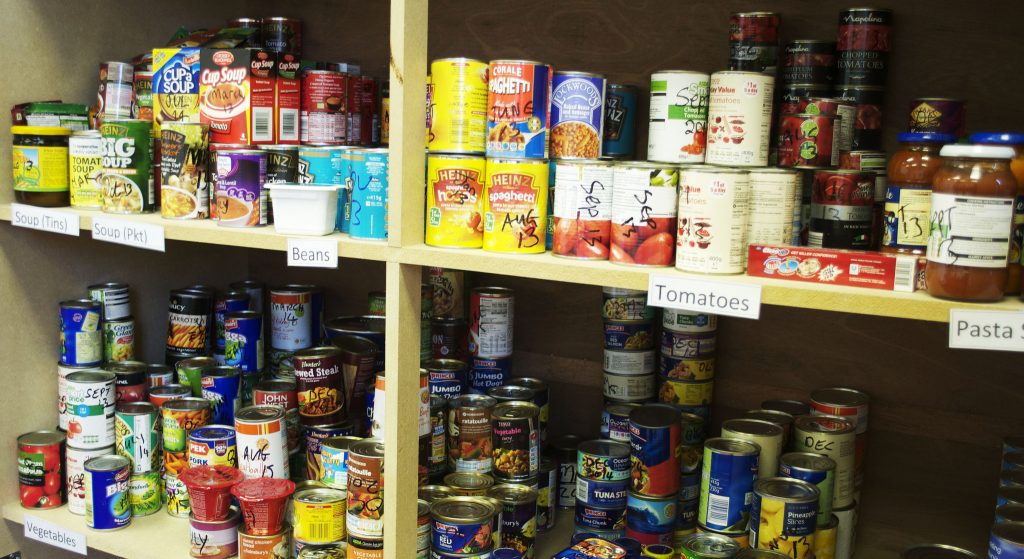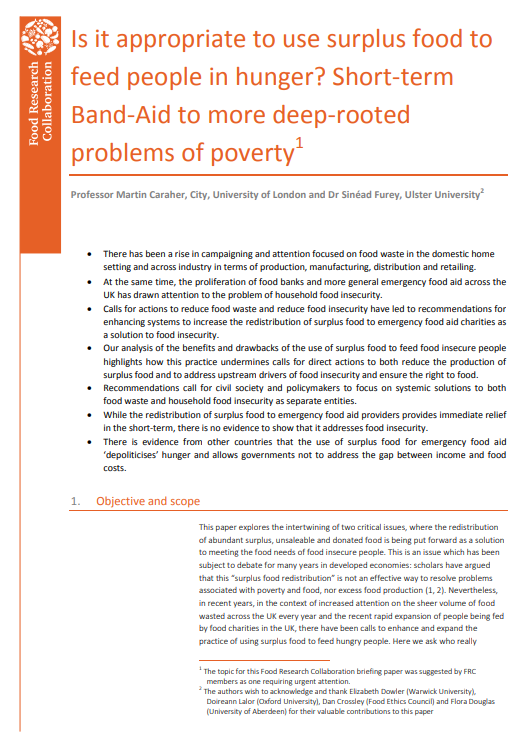There has been a rise in campaigning and attention focusing on food waste in the domestic home setting and across industry in terms of production, manufacturing, distribution and retailing. At the same time, the proliferation of food banks and more general emergency food aid across the UK has drawn attention to the problem of household food insecurity. Calls for actions to reduce food waste and reduce food insecurity have led to recommendations for enhancing systems to increase the redistribution of surplus food to emergency food aid charities as a solution to food insecurity.
This briefing paper analyses the benefits and drawbacks of the use of surplus food to feed food insecure people, highlighting how this practice undermines calls for direct actions to both reduce the production of surplus food and to address upstream drivers of food insecurity and ensure the right to food. Recommendations call for civil society and policymakers to focus on systemic solutions to both food waste and household food insecurity as separate entities.



5 Comments
I am interested in this paper! I work as the Public Affairs Manager for Dietitians of Canada. In principle, we are opposed to diversion of “food waste” to food banks. thanks for your article!
I am a director of Norwich FoodHub C.I.C., we collect and redistribute food that would otherwise be wasted, supporting various groups that help vulnerable people. Overall I understand that using food waste to help people in food poverty is not a sustainable long term solution to food poverty, conversely using food waste to feed hungry people does not alleviate the issue of food waste. However whilst both co-exist, the work we do not only benefits those in need, it helps to highlight the inequalities and imbalances of power that exist within the economy and the food system more specifically. It is only through highlighting these issues that we can bring them to the attention of those in positions of power to change the status quo.
Individual hunger is immediate! The issue of hunger needs a good resolution; however, hungry PEOPLE need food. This is not an either/or situation – it is both/and! We cannot let people go hungry when there is excess food simply because a better solution has not yet been found. So yes, work on the issue of hunger, and solve it! But in the meantime, feed the hungry people!
I agree with Rowan (thankyou for putting it so eloquently Rowan). Food surplus redistribution is not a long-term solution. However it does highlight the amount of surplus that is being produced. Linking that grotesque surplus and waste to the fact that people in this country are going hungry further dramatizes the grotesqueness of the waste. “It is only by highlighting these issues that we can bring them to the attention of those in power to change the status quo”.
I am co-founder of Shrewsbury Food Hub – we collect surplus food from 8 supermarkets and distribute to 32 community groups in our town who can use the food. The food we save has an impact that goes way beyond just food – we save the local Hospice 10% of their food costs – that’s more money available for patient care. A kitchen at a facility for people with disabilities – now no longer buys vegetables because we supply them all because we collect from 8 supermarkets so can even out supply – so more money in their budget for other activities. One Church tea party (designed to overcome social isolation) says we cover 95% of their food costs – which means they have enough resource to subsidise transport to the event. So surplus food not only tackles food poverty – by the way, where else are people going to get fresh fruit and veg? Surplus food is a mechanism for building resilient communities. One of our playgroups was about to close because the staff were having to buy food for the children out of their own pocket – deliveries 3 times a week from the food hub have given them the confidence to continue. Food Poverty is just one of the many problems that our country faces. It is more important than ever to be connected, resilient and resourceful. Letting surplus food go to waste is criminal – it should be diverted and put to good use. I agree with Rowan that our work to divert surplus food gives us a credible voice to highlight the problems in the food system and be part of a solution. Through our food hub groups we “talk” to 2000 people a week about food dates – dispelling the myths about best before.